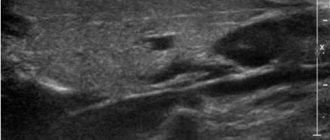The article was checked by the Head of the IVF Department, reproductive specialist, gynecologist-endocrinologist I.Yu. Kuranosova. , is for general informational purposes only and does not replace specialist advice. For recommendations on diagnosis and treatment, consultation with a doctor is necessary.
At the Yauza Clinical Hospital, the PCR (polymerase chain reaction) method, as well as enzyme-linked immunosorbent assay, is used to diagnose cytomegalovirus infection (CMVI) in adults and children. Our clinic has the technical capabilities to reliably examine women before and during pregnancy for the presence of CMV infection in her or the fetus. After studying laboratory diagnostic data and a clinical examination of the patient, the gynecologist develops an individual treatment regimen for the identified pathology.
Cytomegalovirus (CMV) is a common DNA variant virus that uses human cells to survive. Between 50 and 80% of adults have cytomegalovirus infection by age 40. Almost every third child is already infected with cytomegalovirus by the age of 5. The immune system of a healthy person usually prevents cytomegalovirus from causing illness. However, the infection can cause serious health problems in people with weakened immune systems and in children infected before birth (congenital cytomegalovirus).
- 0.2-2.5% - frequency of diagnosis of cytomegalovirus infection in newborns
- With primary CMV infection in the mother, the risk of infection of the fetus reaches 50%.
- The PCR method makes it possible to diagnose the presence (or absence) of cytomegalovirus in the human body with 100% probability.
Make an appointment with a gynecologist
What is cytomegalovirus infection?
CMV (cytomegalovirus infection) is an infection with cytomegalovirus, one of the types of herpes viruses (herpesvirus type 5).
Other types of herpes viruses cause oral and genital herpes (herpes simplex virus types 1 and 2), chickenpox (herpes virus type 3). Epstein-Barr virus (herpesvirus type 4) is the causative agent of Burkitt's lymphoma, infectious mononucleosis.
CMV, like other herpes viruses, is often present in the body of adults. However, patients with a normally functioning immune system do not develop the disease. They are carriers of the virus. When the immune system is suppressed, the virus is activated, already causing clinical symptoms.
Features of the virus
Human cytomegalovirus is a DNA virus from the herpesvirus family.
Other members of this family are the causative agents of herpes, chickenpox, mononucleosis and other diseases. CMV develops in connective tissue cells and often spreads throughout the body. Replication of viral particles occurs in leukocytes: the pathogen enters the cell, introduces its own genetic information into the nucleus and triggers the assembly of the necessary protein components. After replication, virions leave the affected cell and attack other leukocytes, affecting external receptors. The mechanism of transmission of the virus has not been thoroughly studied, but experts know that CMV can be present in almost all biological fluids, including saliva, semen, urine and blood. It is believed that the infection is most often transmitted through kissing and sexual contact. Due to its moderate contagiousness, infection requires close contact with a carrier of the virus.
In the external environment, the virus quickly loses its virulent properties, so the household route of transmission is not so common. CMV is easily inactivated by ethanol and exposure to high temperature. After entering the body, the virus is not destroyed by the immune system, however, lymphocytes are able to secrete immunoglobulins that remain in a person throughout life.
Pathogenesis (what happens?) during Cytomegalovirus infection
The entry point for Cytomegalovirus is the mucous membrane, mainly of the upper respiratory tract and oropharynx. Infection can also occur through the genitourinary system, gastrointestinal tract and other organs.
There are no structural changes observed at the injection site. After the virus enters the body, it begins to attack mono- and lymphocytes, as well as the epithelium of the salivary glands, kidneys, lungs and other internal organs. In this case, cytomegaly is observed (an increase in the size of the affected cells by 3-4 times). Immature virions are formed in the cell nuclei. As a result, the cellular structures take on the appearance of an “owl’s eye.” The active course of the disease leads to the development of depression of most parts of the immune system, including the IFN-α protein.
In response to the penetration of CMV, a protective reaction develops - specific antibodies are formed, and delayed-type hypersensitivity is observed. This process is accompanied by the appearance of nodular formations of lymphocytic infiltrates. Cells that have been infected continue to function, secreting a special secret that masks the virus from the protective functions of the human body.
Prognosis and prevention
In immunocompetent people, carriage of the virus does not affect the quality of life. Only a few studies indicate the risk of developing atherosclerosis with long-term persistence of CMV in the body. The prognosis for immunodeficiency depends on the clinical manifestations of the disease and the timeliness of treatment. The highest mortality rate is characterized by cytomegalovirus pneumonia.
Prevention methods:
- compliance with personal hygiene rules (You must wash your hands regularly);
- separate meals with the child;
- regular cleaning of any objects that have come into contact with the child’s urine or saliva (This is especially true for toys);
- using a condom;
- regular examinations for HIV positive status and other conditions that negatively affect immunity.
- drug prevention of infection during organ transplantation and use of immunosuppressants.
Thus, cytomegalovirus infection is a viral disease that can affect human organs and tissues when the immune system is impaired. First of all, this pathology is dangerous for pregnant women and children, so screening for CMV must be carried out in advance.
Cytomegalovirus - symptoms of CMV
Congenital form of cytomegalovirus infection
Most children with congenital cytomegalovirus infection never show symptoms or have any health problems. However, some may have health problems that appear at birth or may develop later.
Some children may have the following signs of congenital cytomegalovirus infection at birth:
- problems with the liver, lungs and spleen;
- low birth weight;
- small head size (microcephaly);
- convulsions.
About 1 in 10 babies with CMV will have noticeable signs at birth, such as jaundice or an enlarged liver. They may also have long-term health problems such as hearing and vision loss and developmental delays.
About 40-60% of infants born with signs of congenital cytomegalovirus infection will have long-term health problems, such as:
- mental retardation;
- lack of coordination;
- muscle weakness.
Because signs of cytomegalovirus infection at birth are similar to other medical conditions, the diagnosis should be confirmed by laboratory tests within 2 to 3 weeks after birth.
Acquired form of cytomegalovirus infection
Most healthy people who acquire CMV after birth have an insidious disease and are unaware that they have been infected. In this case, there are no long-term health consequences.
In some cases, cytomegalovirus infection in healthy people can cause the following symptoms:
- fever;
- redness of the throat;
- muscle pain;
- fatigue;
- enlarged lymph nodes.
Once a person becomes infected, the virus establishes a lifelong latency and can recur periodically. Illnesses caused by CMV rarely occur unless a person's immune system is weakened due to therapeutic drugs or illness.
People with weakened immune systems may experience more severe symptoms, affecting the eyes, lungs, liver, esophagus, stomach and intestines.
Mononucleosis-like syndrome
People with normal immunity who become ill with cytomegalovirus infection may experience a syndrome similar to mononucleosis. In this case, lymphomonocytosis is observed in the blood with the appearance of atypical mononuclear cells. The symptoms resemble a cold:
- high body temperature and chills (up to 1 month);
- headache, aches in muscles and joints;
- fatigue, malaise and weakness;
- enlargement of the salivary and lymph glands;
- skin rash resembling rubella rash.
In some cases, with mononucleosis-like syndrome, hepatitis develops - jaundice and an increase in liver enzymes in the blood. In 6% of cases, pneumonia develops as a complication.
Mononucleosis syndrome lasts for 6-90 days. After this, complete recovery occurs. Residual effects may persist for a month (enlarged lymph nodes, weakness, malaise).
Symptoms of cytomegalovirus in men and women
In men, CMV can affect the prostate and testicles. In women, the inner layer of the uterus, ovaries, cervix and vagina.
Symptoms of chronic cytomegalovirus infection
If CMV remains in the body for a long time, the immune system loses the ability to resist it. In this case, there is a prolonged increase in body temperature to 37.1-38.0 degrees. There is an enlargement of lymph nodes of different groups and an enlargement of the liver or spleen (rarely). Myocarditis (inflammation of the muscle tissue of the heart) also develops, and eye damage occurs.
Cytomegalovirus infection in people with normal immunity
It is not characterized by significant deviations, so a person’s life activity remains unchanged. The body's protective functions independently cope with CMV.
Cytomegalovirus infection in AIDS
An extremely severe course of the disease is noted. It is possible that a generalized form of infection may develop, in which damage to internal organs is observed:
- brain (dementia, encephalitis, meningitis);
- lungs (pneumonia, pneumonitis);
- kidneys (renal failure, nephritis with necrosis);
- eye (retinitis, complete blindness).
Damage to the liver (hepatitis), heart, adrenal glands, spleen, intestines, esophagus, etc. is less common. The prognosis in most cases is unfavorable.
Cytomegalovirus during pregnancy
If primary infection with cytomagalovirus occurs in pregnant women, they may experience the following complications:
- premature birth;
- spontaneous miscarriage;
- polyhydramnios;
- frozen pregnancy;
- intrauterine infection of the fetus, severe damage to its nervous system;
- fetal death.
Particularly severe consequences occur when the fetus is infected in the 1st trimester of pregnancy. In the case of pregnancy against the background of a pre-existing cytomegalovirus infection, in the chronic course of this pathology, when there are already protective antibodies in the woman’s blood, the probability of infection of the fetus does not exceed 10%. That is why, even at the stage of planning conception, it is necessary to be examined for the presence of TORCH infection (toxoplasmosis, rubella, cytomegalovirus, herpes, other infections).
If intrauterine infection of the fetus occurs, the risk of death of newborns is high. Survivors are often diagnosed with serious abnormalities:
- lack of vision and/or hearing;
- microcephaly;
- brain calcification;
- impaired growth and formation of the musculoskeletal system;
- hepato- and splenomegaly;
- pneumonia;
- frequent hemorrhages in parenchymal and hollow organs;
- delayed mental and physical development;
- heart diseases.
Cytomegalovirus infection during pregnancy is, of course, an alarming and dangerous factor. However, this is not a verdict. You need to see a doctor and follow medical recommendations, minimizing the risk of possible complications.
- The use of antiviral drugs in 80% of cases helps to stop the exacerbation - the virus and antibodies indicating its activity (IgM) disappear from the blood of patients.
- The use of human immunoglobulin for the treatment of the manifest form of CMV in pregnant women stops the reproduction of the virus and its elimination from the body in 75% of cases.
Classification and stages of development of cytomegalovirus infection
Acquired CMV can be latent or manifest. In the first case, we are talking about the absence of clinical signs. Diagnosis can only be made by laboratory tests. The manifest form of cytomegalovirus can be localized - sialoadenitis, and generalized - damage to the stomach and intestines, development of hepatitis, etc. In the congenital form, acute (death is often inevitable when a newborn is infected) and chronic course of the disease is possible. Cytomegalovirus infection is isolated separately in HIV-infected people.
According to the severity of CMV, there are:
- mild – there is no obvious damage to internal organs and no change in function;
- moderate - dysfunction of internal organs is moderate, no critical changes are observed;
- severe - damage to internal organs is pronounced (catastrophic functional failures are observed and complications develop).
Diagnostics
The necessary examinations can be completed by an infectious disease specialist. The doctor will ask the patient about complaints, carefully review the medical history to identify risk factors, and conduct a general examination. An active infection in immunocompetent people is manifested by symptoms of mononucleosis, so to clarify the diagnosis, a specialist will need the results of laboratory and instrumental studies.
Prescribed diagnostic procedures:
- Blood test for immunoglobulins. In the first weeks after infection, IgM antibodies are detected in patients. Also, the presence of these antibodies may indicate an exacerbation of a chronic disease. A high concentration of IgM in a pregnant woman indicates a risk of damage to the fetus. If the patient has IgG antibodies, the doctor suspects viral carriage without clinical manifestations.
- Polymerase chain reaction - detection of viral DNA in biological fluids and patient tissues. An assessment of the number of viral particles allows us to draw a conclusion about the severity of the pathology.
- Examination of organs for active infection. The doctor prescribes visual diagnostics and additional tests, such as a biochemical blood test to detect liver failure.
If primary CMV infection is detected in the body, it is recommended to undergo screening for HIV infection to exclude complications. Also, patients at risk necessarily require regular monitoring.
Complications of cytomegalovirus infection
In most cases, complications with CMV infection are specific:
- pleurisy and pneumonia;
- myocarditis;
- arthritis;
- sensory disturbance;
- encephalitis.
Nonspecific complications are also observed, which are caused by the addition of a secondary bacterial infection. We are talking about purulent complications. In this case, the body temperature rises to 40-41 degrees, and a corresponding clinical picture of damage to internal organs appears.
Cytomegalovirus can cause miscarriage, stillbirth, or death of an infant immediately after birth. Take care of your child's health. Make an appointment with a doctor to promptly identify the presence of the disease in the body and treat it.
Transfer methods
For cytomegalovirus to invade the body, contact with an infected biological fluid is necessary. It is believed that the largest number of viral particles is contained in saliva, so the infection is most often transmitted through kissing. The airborne mechanism of transmission of the disease implies a risk of infection even when talking with a carrier of the virus, since saliva can enter the oral cavity.
Other infection options:
- Sexual transmission: The virus is transmitted through vaginal mucus, lubricant and semen.
- Transmission of the disease from mother to child through the placenta. Infection of a newborn is also possible during childbirth.
- Organ transplantation and blood transfusion.
The risk of intrauterine transmission of CMV increases if a woman first becomes infected with the infection during pregnancy. In children and adults, pathogen invasion can occur even with minor contact: a person touches their eyes and lips with dirty hands after contact with a carrier of the infection.
4. Treatment of the disease
Special drugs are used to treat cytomegalovirus. Often they need to be administered intravenously, for example, over a course of two weeks. Once the infection is under control, maintenance therapy may be prescribed - taking pills daily. There are drugs that are specifically used to treat eye lesions from cytomegalovirus.
There are a number of drugs that do not directly treat cytomegalovirus, but inhibit its growth and slow down the progression of the disease.
Medicines to treat cytomegalovirus are quite strong and can cause serious side effects - neutropenia (low white blood cells), fatigue (anemia), nausea or vomiting, rash, and decreased testosterone levels. A number of drugs have side effects in the form of kidney problems. However, a number of drugs will help cope with these unpleasant problems during the treatment of cytomegalovirus.
Clinical picture
The duration of the incubation period remains unclear since the initial forms of CMV infection occur latently. Characteristic clinical symptoms develop as a result of exposure to factors that weaken the immune system.
Congenital CMV infection in children in early periods of life also occurs as an asymptomatic carriage. Then it manifests itself in the form of various severe complications, the most common:
- Deafness.
- Chorioretinitis.
- Cytomegalovirus syndrome.
In particularly severe cases, congenital CMV infection leads to secondary pathologies and death in the first weeks of life. You can avoid these consequences by doing a blood test for cytomegalovirus before conceiving a child.
Complexes with this research
IVF planning Examination for preliminary preparation of a woman for the IVF procedure 13,260 ₽ Composition
Miscarriage Identification of the main causes of miscarriage 40,440 ₽ Composition
Pregnancy planning. Diagnosis of infections 14 tests for expectant mothers 8,800 ₽ Composition
IN OTHER COMPLEXES
- Examination during pregnancy. 1st trimester 17,040 RUR
- Joining IVF RUB 23,500
- TORCH infections. Avidity of IgG antibodies RUB 9,260








